Choosing between an infinity pool and a standard pool depends on your budget, space, and what you value. Infinity pools create a stunning, luxurious look perfect for hillside or scenic locations but come with higher installation, maintenance, and safety costs. Standard pools are more affordable, adaptable, and easier to care for, appealing to families and practical buyers. For insights on which option fits your goals best, continue exploring the differences.
Key Takeaways
- Infinity pools offer higher aesthetic appeal and customization, boosting property value and market demand in luxury segments.
- Standard pools are more cost-effective to install and maintain, making them practical for broader buyer appeal.
- Infinity pools require specific landscapes and safety measures, increasing initial and ongoing costs compared to versatile standard pools.
- Infinity pools can enhance scenic views and create a luxurious ambiance, but safety risks may impact usability and resale in families.
- The choice depends on budget, landscape suitability, safety priorities, and target market, influencing long-term investment payoff.
Design and Aesthetic Appeal
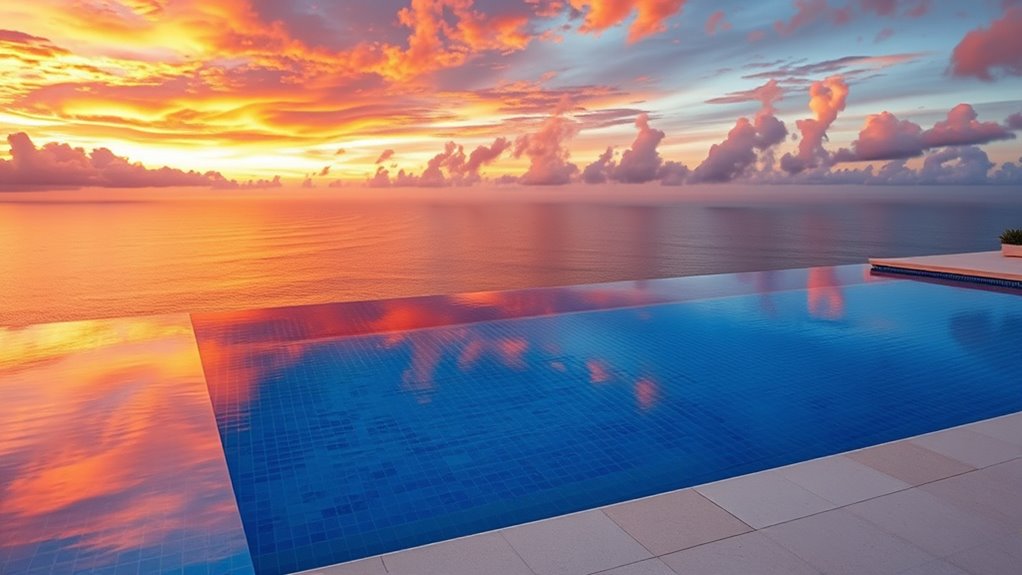
When it comes to design and aesthetic appeal, infinity pools immediately stand out with their sleek, modern look that creates the illusion of the water extending seamlessly into the horizon. You’ll notice how their clean lines and unobstructed views make them feel like an extension of the landscape. The edge design, often called a vanishing edge or negative edge, draws your eye outward, giving a sense of openness and luxury. This visual effect can dramatically enhance your outdoor space, making it feel more expansive and elegant. Unlike traditional pools, which have a defined boundary, infinity pools blend into their surroundings, offering a unique, breathtaking view. If aesthetics are your priority, an infinity pool provides a striking, contemporary statement that elevates your overall property design.
Cost of Installation and Construction
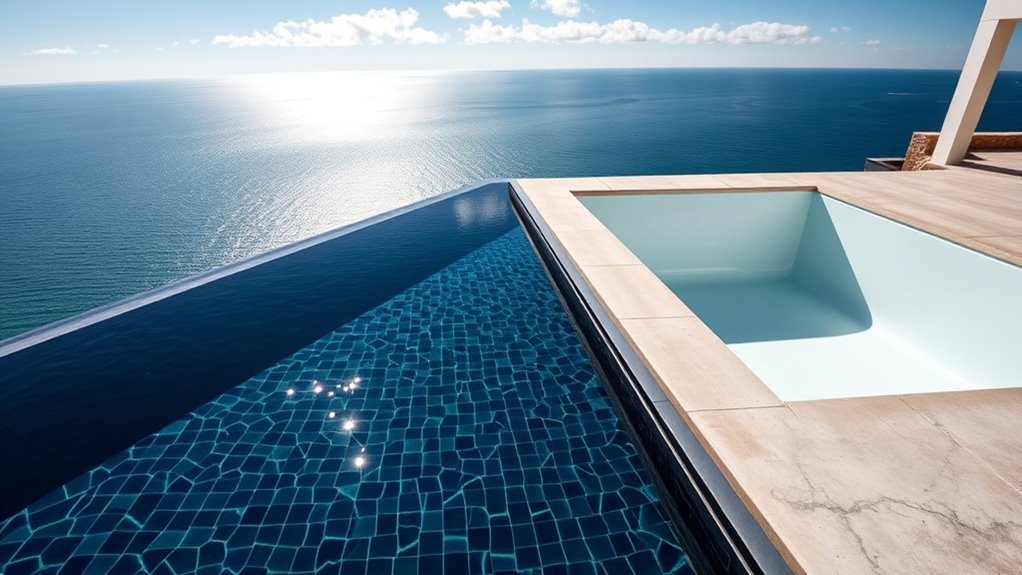
You’ll find that infinity pools often require a larger initial investment due to their complex construction and specialized design features. In contrast, standard pools usually have simpler builds, making them more budget-friendly upfront. Additionally, the costs of materials and design elements can vary considerably between the two, affecting your overall expenses. Proper planning and understanding of construction complexities, such as retrofitting homes for heat pumps, can also influence the overall project costs.
Initial Investment Differences
Installing an infinity pool typically requires a substantially higher initial investment than a standard pool due to its complex design and specialized construction needs. You’ll need to budget more for materials, labor, and advanced engineering. The unique edge design, often involving custom concrete work, adds to the cost. Additionally, the need for precise leveling and high-quality finishing increases construction expenses. You might also face higher permit and inspection fees because of the pool’s sophisticated features. In contrast, a standard pool generally involves simpler construction methods, reducing upfront costs. Overall, the initial outlay for an infinity pool can be double or more compared to a standard pool, making it a significant financial commitment upfront.
Construction Complexity Variations
The complexity of constructing an infinity pool considerably influences both the installation process and overall costs. Infinity pools require precise engineering to achieve the seamless edge effect, often involving custom structural supports and specialized waterproofing. This complexity means more planning, skilled labor, and longer construction times compared to standard pools. Standard pools are straightforward to build, with well-established designs and materials, reducing both labor and material expenses. In contrast, infinity pools demand meticulous site assessment and advanced construction techniques, which escalate costs. Additionally, ensuring proper drainage and structural integrity adds layers of difficulty. The availability of regional resources can also impact the construction timeline and costs, as access to specialized contractors varies by location. Overall, the added complexity of infinity pool construction leads to higher installation costs and potential delays, making it a more demanding project than building a traditional pool.
Material and Design Costs
Material and design costs for infinity pools are substantially higher than those for standard pools due to their specialized construction requirements. You need premium materials like reinforced concrete and custom glass panels, along with precise engineering. This complexity increases labor and material expenses significantly. Here’s a quick comparison:
| Aspect | Standard Pool | Infinity Pool |
|---|---|---|
| Construction Materials | Basic concrete, vinyl, fiberglass | Reinforced concrete, glass panels |
| Design Complexity | Simple shape | Custom, seamless edges |
| Installation Time | Shorter | Longer, detailed work |
| Equipment Costs | Standard pumps and filters | Specialized pumps and automation |
| Structural Needs | Less demanding | Extra support for edges |
Expect to pay more upfront, but the unique aesthetic might justify the investment. Additionally, design intricacies and specialized features contribute to the overall higher costs.
Long-term Maintenance and Upkeep
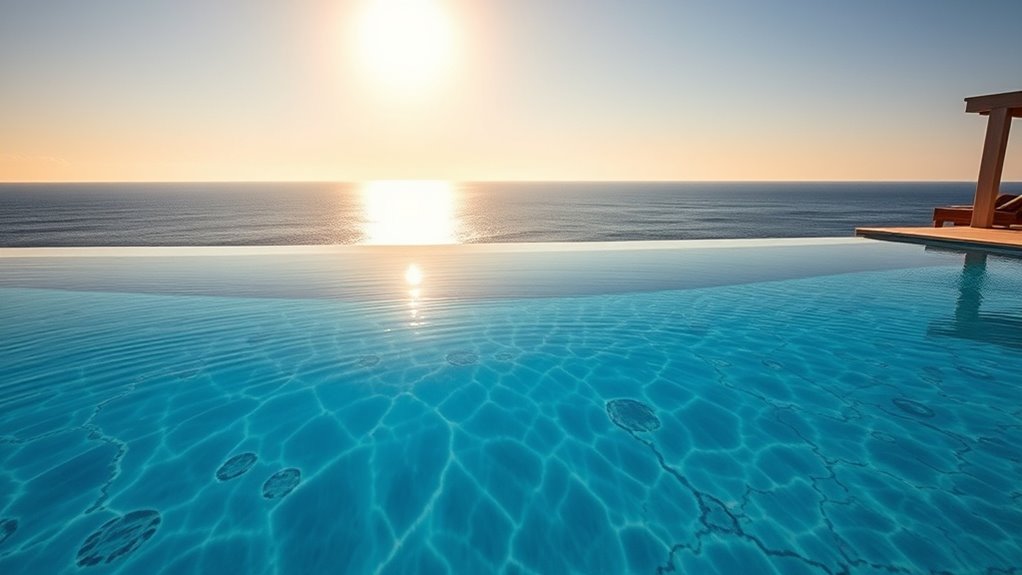
While both infinity pools and standard pools require regular maintenance, infinity pools often demand more ongoing attention due to their complex design features. The unique design, especially the vanishing edge, means you need to keep the water level consistent and check for leaks more frequently. The filtration system can be more intricate, requiring specialized care to ensure proper water flow and clarity. Additionally, the spillover edge may collect debris, so you’ll need to clean it more often. The constant exposure to the open environment can lead to faster wear and tear, meaning you’ll spend extra time balancing chemical levels and inspecting structural elements. Overall, maintaining an infinity pool is more labor-intensive, requiring diligent upkeep to keep it looking pristine and functioning properly.
Energy Efficiency and Operating Expenses
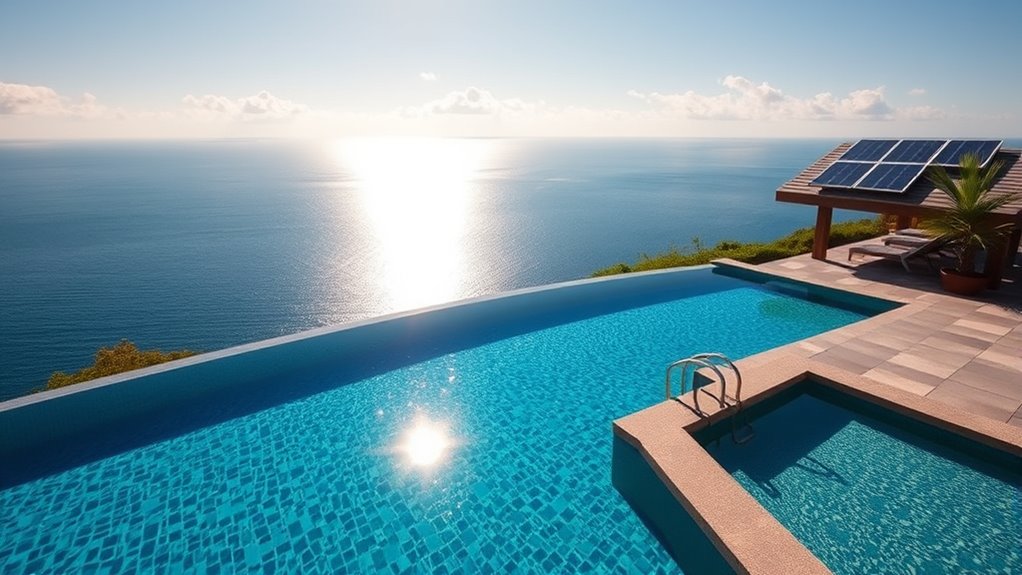
Infinity pools generally consume more energy and cost more to operate than standard pools because of their complex features, such as the constantly running variable-speed pumps for the vanishing edge and spillover systems. These features require continuous operation to maintain the seamless water flow and visual effect, leading to higher electricity bills. In contrast, standard pools typically have simpler circulation systems, which use less power. Additionally, the advanced filtration systems in infinity pools often run longer to keep water clear and balanced, adding to operating expenses. If energy efficiency is a priority for you, keep in mind that infinity pools may demand more ongoing costs. Upgrading equipment and investing in energy-efficient pumps and automation can help offset some of these expenses over time.
View and Visual Impact
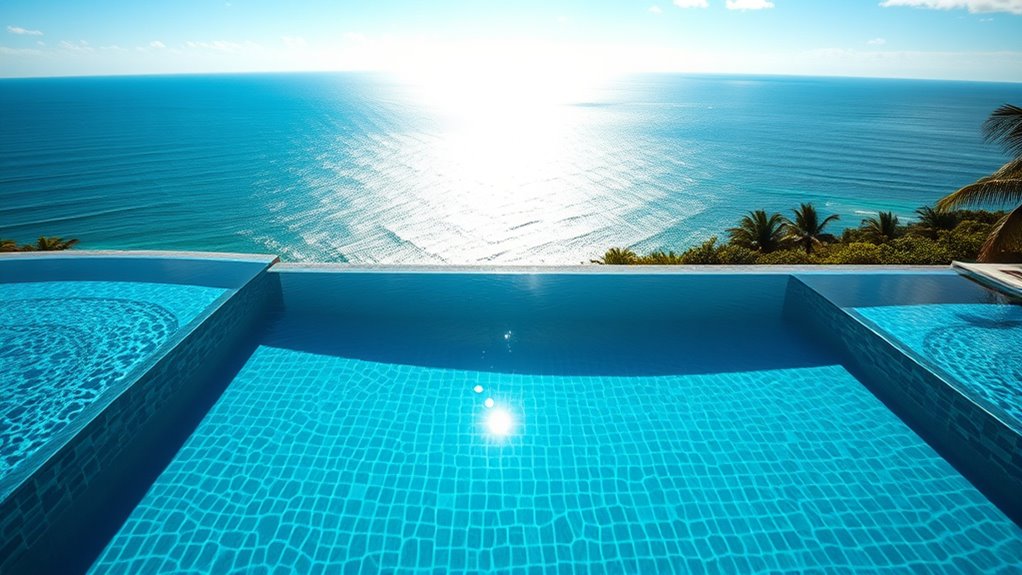
The visual appeal of an infinity pool often exceeds that of a standard pool, offering a striking and luxurious look. With its seamless edge that appears to merge with the horizon, it creates a breathtaking view, especially in scenic locations. This design emphasizes openness and elegance, making your outdoor space feel more expansive. In contrast, a standard pool has defined edges that frame the water, which can be less dramatic but more structured. If you value a stunning visual impact and want your pool to serve as a focal point, an infinity pool delivers unmatched aesthetic appeal. It transforms your backyard into a luxurious retreat, enhancing both the scenery and your overall outdoor experience. Incorporating rustic elements such as natural materials and vintage decor can further elevate the aesthetic and create a cohesive outdoor ambiance.
Safety Considerations
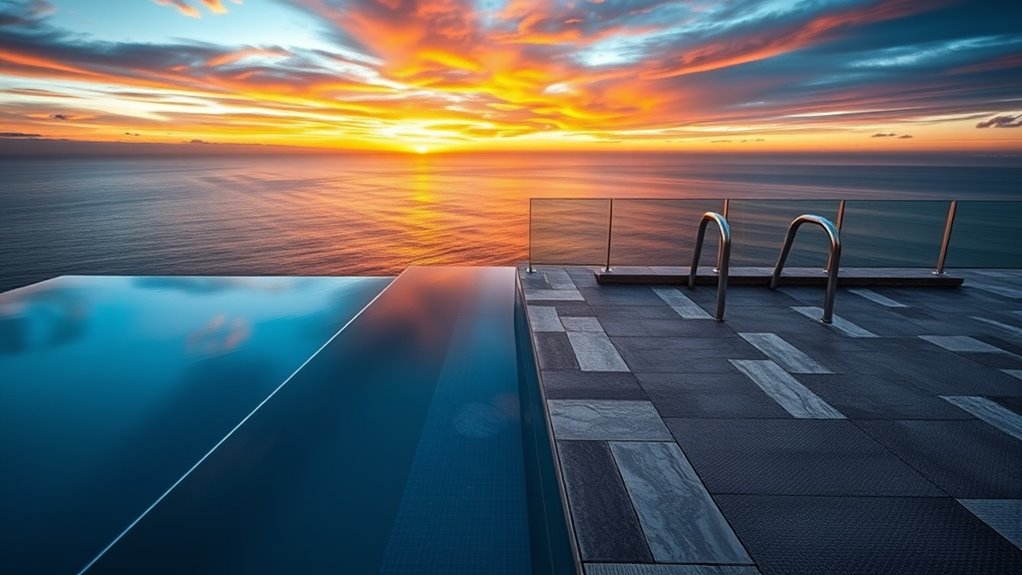
Because of their design, infinity pools can pose unique safety risks that you need to take into account carefully. The open edge creates a visual illusion of water extending endlessly, but it also increases the risk of accidental falls, especially for children or guests unfamiliar with the setup. You should guarantee proper barriers or safety fences are installed to prevent mishaps. Additionally, the overflow edge can make surfaces slippery when wet, so non-slip materials are essential around the pool area. Regular maintenance is crucial to keep the water levels balanced and prevent overflow or structural issues. Always educate household members about safety rules and supervise children closely. While stunning, infinity pools require extra precautions to keep everyone safe without detracting from their visual appeal. Incorporating safety features such as alarms or covers can further enhance security and peace of mind.
Resale Value and Property Enhancement
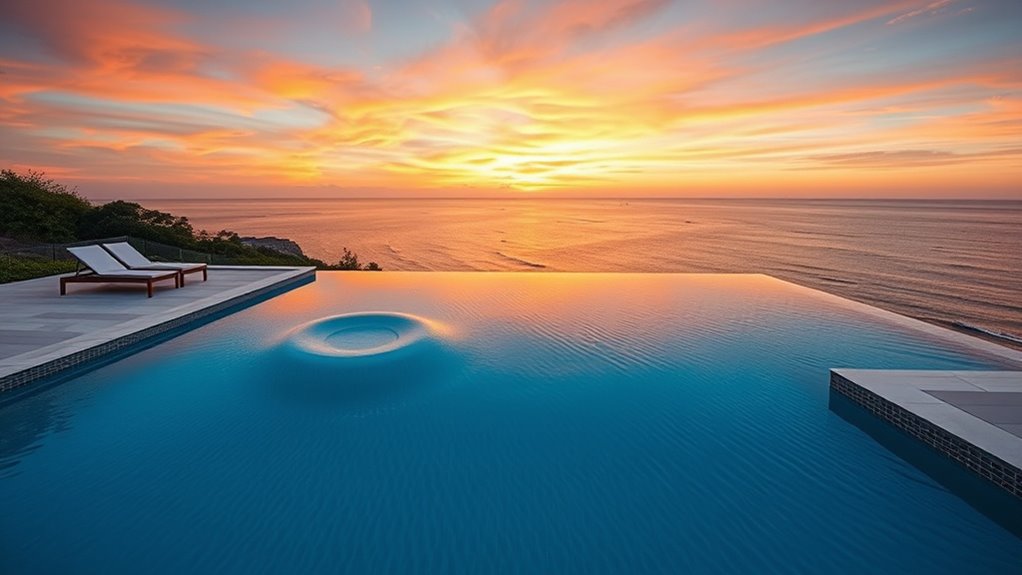
Your choice of pool can considerably boost your property’s resale price and curb appeal. An infinity pool often attracts buyers looking for luxury, increasing market demand and value. Considering how your pool style influences aesthetic appeal can give your property a competitive edge when selling. Additionally, trust-building activities within your property’s features can enhance its desirability and emotional appeal to potential buyers.
Resale Price Impact
Have you ever wondered how a luxury infinity pool can boost your property’s resale value? An infinity pool often appeals to upscale buyers, making your home stand out in the market. Its sleek design and luxurious vibe can command higher asking prices, especially in affluent neighborhoods. Potential buyers see it as a premium feature that adds both prestige and functionality. This increased desirability can shorten your home’s time on the market and lead to higher offers. Additionally, the residency requirement in your area can influence how quickly you can capitalize on this feature if you decide to sell. However, keep in mind that the added value depends on your location, property size, and the pool’s quality. While an infinity pool can notably boost resale price, it’s essential to weigh the initial investment against potential returns to ensure it pays off in the long run.
Property Aesthetic Appeal
A striking pool design can dramatically enhance your property’s overall look, making it more attractive to potential buyers. An infinity pool, with its sleek, modern edge and seamless water flow, creates a luxurious focal point that elevates your yard’s aesthetic. It adds a sense of sophistication and exclusivity, which can boost curb appeal. On the other hand, a standard pool offers a classic, versatile look that complements various landscape styles. Both options can serve as stunning visual features, but an infinity pool often commands a higher perceived value due to its design elegance. Additionally, Volkswagen Tuning techniques can be applied to improve the functionality and aesthetic appeal of pool-related features, such as pumps and lighting, further enhancing your property’s overall appeal. When well-maintained, either pool type can substantially improve your property’s overall appeal, making it stand out in the market and potentially increasing its resale value.
Market Demand Influence
The choice of pool type can substantially influence your property’s resale value and market appeal. An infinity pool often attracts buyers seeking luxury and modern aesthetics, potentially boosting your home’s desirability and resale price. Its unique design can set your property apart, making it more appealing in competitive markets. Conversely, a standard pool appeals to a broader audience due to its practicality and lower maintenance costs, which can also enhance market value. Consider your target buyers—luxury seekers may favor infinity pools, while families might prefer the straightforward functionality of standard pools. Additionally, understanding local investment options can help you assess how your pool investment aligns with broader property value strategies. Ultimately, your pool choice can affect how quickly you sell and the price you fetch, making market demand a vital factor in your decision.
Customization and Features
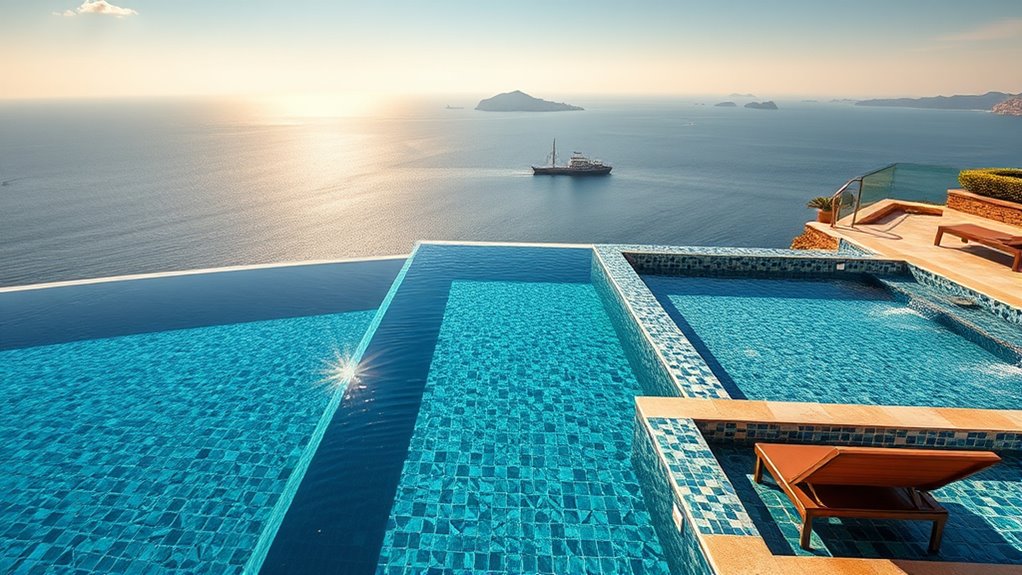
When it comes to customization and features, infinity pools offer a level of flexibility that many standard pools can’t match. You can tailor the design to fit your aesthetic preferences, incorporating unique shapes, materials, and finishes. Features like built-in lighting, waterfalls, and integrated spas are easier to include, enhancing both looks and functionality. Infinity edges can be customized with different water flow effects or lighting setups to create a stunning visual impact. In contrast, standard pools tend to have more limited options, often sticking to traditional shapes and basic features. If personalization and advanced features matter to you, infinity pools provide more opportunities to craft a luxurious, customized outdoor space that truly reflects your style.
Suitability for Different Landscapes

Infinity pools often demand specific landscape features to achieve their dramatic, seamless look. You’ll need a hillside or an edge that can accommodate the overflow, making them ideal for sloped terrains. If your property is flat, creating the necessary drop-off can be costly and complex. Standard pools, on the other hand, are versatile and fit well into any landscape—flat, urban, or rural—without major modifications. They can be integrated into backyard gardens, patios, or small spaces without special design considerations. When choosing between the two, consider your landscape’s natural features and your willingness to modify the terrain. Infinity pools excel in scenic locations, while standard pools offer more flexibility, making them suitable for a wider range of landscapes.
Frequently Asked Questions
Which Pool Type Has a Longer Lifespan With Proper Maintenance?
A standard pool generally has a longer lifespan with proper maintenance. Its simpler design and fewer specialized components make it easier to care for and repair over time. Infinity pools, with their advanced engineering and unique features, require more frequent upkeep and delicate handling, which can lead to higher long-term costs. If longevity is your priority, sticking with a well-maintained standard pool is usually the smarter choice.
Are There Any Environmental Concerns Associated With Infinity Pools?
Yes, there are environmental concerns with infinity pools. They often require high water usage and frequent chemical treatments, which can impact local water resources. Additionally, their construction and maintenance may involve energy consumption for pumps and filtration systems. You should consider these factors and explore eco-friendly options, like solar-powered pumps or sustainable materials, to minimize environmental impact while enjoying your luxurious infinity pool.
How Do Climate Conditions Affect the Choice Between Infinity and Standard Pools?
Climate conditions play a big role in your pool choice. If you’re in a warm, sunny area, an infinity pool can be stunning and easier to maintain, as evaporation is less of a concern. But if you face cold winters or frequent storms, a standard pool might be more practical, durable, and cost-effective. Your local weather influences not just aesthetics but long-term maintenance and enjoyment, guiding you toward the best fit.
Can Both Pool Types Be Integrated With Renewable Energy Sources?
Yes, both infinity and standard pools can be integrated with renewable energy sources. You can install solar panels to power your pool pumps, heating systems, and lighting, reducing your carbon footprint and energy costs. Solar pool heaters are especially effective, providing efficient heating without relying on fossil fuels. By choosing renewable energy options, you’ll enjoy your pool while contributing to a more sustainable environment.
What Are the Insurance Implications for Installing Each Pool Type?
You should know that installing an infinity pool often comes with higher insurance premiums because of its increased risk factors, like structural complexity and potential safety hazards. Standard pools usually cost less to insure, but it’s still essential to inform your insurer about the pool’s type and features. To avoid surprises, compare policies and coverage options carefully, and consider adding safety features to reduce your premium costs.
Conclusion
Choosing between an infinity pool and a standard pool is like selecting a brushstroke for your personal masterpiece—each adds its own unique beauty and value. While an infinity pool offers breathtaking elegance and a sense of boundless luxury, a standard pool provides reliable enjoyment and practicality. Consider your landscape, budget, and dreams—because your pool isn’t just water; it’s the reflection of your lifestyle, an oasis that transforms your home into a sanctuary of endless possibilities.










